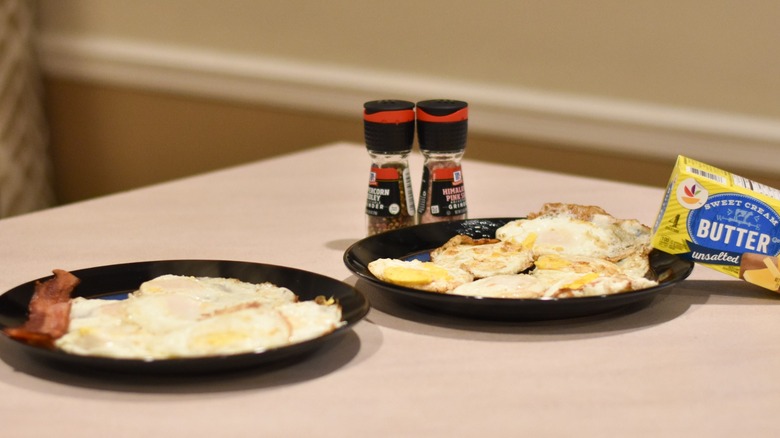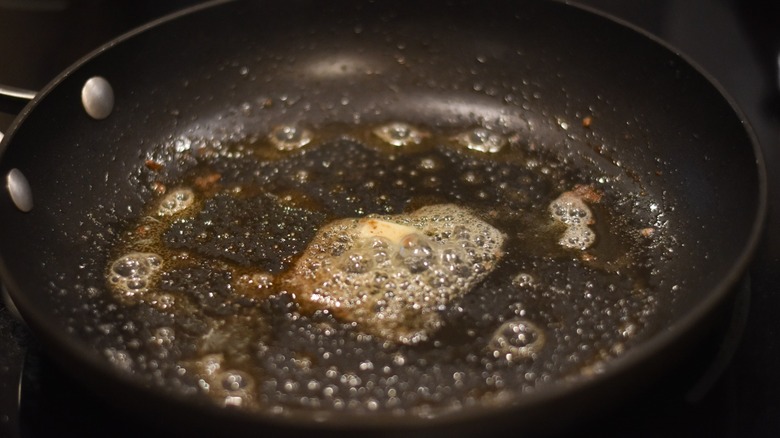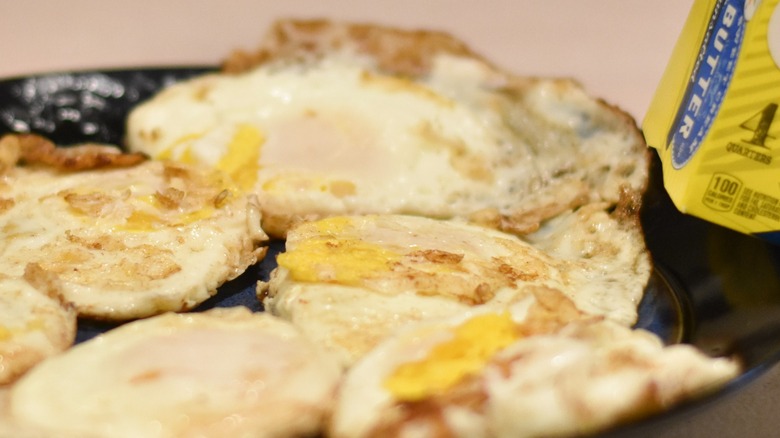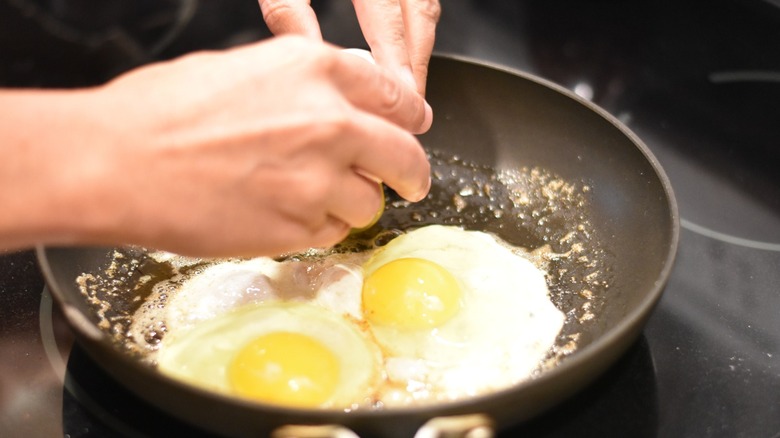Bacon Grease Vs Butter: Which Produces The Best Fried Egg?
We may receive a commission on purchases made from links.
There's nothing like the smell of fried eggs and bacon to get you started in the morning. As one of our favorite breakfasts (or lunches or dinners), this is a crowd pleaser that brings in plenty of protein for a hearty start to the day.
But while some of us grew up with good ol' bacon grease to fry our eggs in, others woke up to sizzling butter in the skillet instead. We put the two methods to the test to see which made the better eggs. Along with following the top tips for the perfect fried egg, picking the right ingredients is key.
We fried six eggs using bacon grease and six using butter to see which had the tastiest results. We also considered which was easier to use, store, and find at the grocery store, since the last thing we want before our morning coffee is to search around for ingredients or have to execute complicated cooking maneuvers. While both made great tasting eggs, each method had its pros and cons.
Bacon grease requires special prep
You'll have to make a batch of bacon to get the savory grease that you need for your eggs. For us, this meant enjoying a side of bacon, but it does add time to your breakfast prep. Depending on what you feel like eating, it may be a step that you don't want to be bothered with. If we were making a fried egg to top a burger or a savory dish of ramen, cooking up bacon wouldn't be part of our meal.
If you cook with bacon grease often to put a tasty twist on fried chicken and other dishes, you may want to store the extra in a glass dish for future use. We can remember relatives doing this when we were kids, although to be honest, it always looked a little bit gross. Bits of bacon would end up floating in the container, which gave it an unsavory appearance. This makes this storage method a no for us, but we have to give credit to the generations who knew how to get every bit of use out of everything in the kitchen. You can always strain the leftover grease through cheesecloth, but that adds more work.
Modern chefs can buy rendered bacon fatat the grocery store, which comes in tubs similar to spreadable butter. This makes it easier to use and store. Plus, you don't have to cook up a dish of bacon to get it.
Butter is quick and easy
You likely have butter already on hand in your fridge, so melting it for your fried egg doesn't require an extra trip to the store. You don't even need to let it soften, since it will melt in the pan as it heats. This ingredient is ready to go in mere seconds, resulting in faster fried eggs.
You won't need a lot, just a small pat melted in a pan. The more you use, the more the egg will fry, but you can overdo it pretty quickly. We ended up needing to add a second helping of butter to the pan for the second batch of eggs. This only slowed things down momentarily, however, since the butter heats and melts within a minute. It's best to keep the heat on low rather than turn it up to melt the butter faster because it can burn so quickly. Brown butter is a staple of the restaurant world, and it is a fantastic way to add extra deep flavor to baked goods, applesauce, and other foods.
Bacon grease splatters
If you've ever cooked bacon, you've probably had to deal with splatters from the pan or griddle. The same thing will happen when you use the bacon grease to fry an egg. A splatter screen helps cut down on this, but it won't let you crack the egg into the pan. Even if you use a screen, you'll still have to lift it once the grease is hot to add the egg. You'll likely be met with at least a little bit of hot splatter.
But the benefit of the hot grease is that the egg's edges turn out crispy and delicious. This helped the egg stay together and reduced breakage, which is always the trickiest part about flipping your fried egg. The bacon grease method made it noticeably easier to turn the eggs and we ended up with perfectly cooked fried eggs that kept their shape.
Butter needs to get hot
The best fried eggs need a super hot pan, but don't go too hot or you'll overcook the eggs. You'll have to make sure that your butter also gets just to the right temperature. It should be shimmering before you add the egg. You don't need a lot, but it should be enough to cover the bottom of the pan. If not, the eggs will end up sticking and be even harder to turn.
Butter melts quickly and browns, so pay close attention as the eggs fry and even before you start cooking. It's easy to turn away for a second and turn back to find that you've browned your butter. It can even start smoking if it continues to heat past the smoke point. You also may find that you need to adjust the heat as the eggs cook, which requires close monitoring. During our tests, butter required a lot more babysitting than bacon grease and the eggs weren't nearly as easy to flip.
Bacon adds saltiness
Bacon adds a distinct flavor to fried eggs, bringing in salty and savory elements. The same reasons that it works well for breakfast make it good for cooking your fried eggs. If you're serving bacon alongside your eggs, it'll make a fantastic pairing.
The downside of bacon grease is that it is heavier than other cooking oils and can make your breakfast too intense. If you prefer a lighter egg, this may end up being too salty and rich. It can also leave a greasy feeling in your mouth that lingers even once you're going about your day and even thinking about lunch.
Because they were easier to flip, we also had more control over the yolks when we fried eggs in bacon grease. There were fewer broken yolks, which kept the runny consistency that we love. Of course, if you prefer an overhard egg, you can always let them cook a little longer to firm up the yolk. The edges were really crispy and uniform, which we attribute to the even cooking in the bacon fat.
Butter is richer
Frying eggs in butter adds a rich flavor to your eggs, similar to other dairy-heavy dishes. But it doesn't have quite the same savoriness that bacon grease adds. Even though they were rich, these eggs were noticeably lighter as we continued to eat and didn't feel as heavy as those fried in bacon grease. The edges were a bit uneven, but that didn't impact the taste, just the visual appeal.
Another big difference in the finished plate of eggs was the number of broken yolks. Because the eggs fried in butter didn't keep their edges as well as those in the bacon grease, they were more likely to fall or break when we flipped them. That meant more broken yolks in the end. We were able to take the eggs off the heat before the yolks cooked all the way through, but they didn't look nearly as appealing as the nice, round ones on the neighboring plate.
Final verdict
Ultimately, we have to go with bacon grease as our preferred method for frying eggs. The edges were crispy, the yolks stayed runny, and that added boost of flavor was just right. Plus, we had bacon to round out our breakfast. We made an entire pound of bacon, so there was plenty of grease to use with homemade hashbrowns as well.
We have to give credit to butter, though. We'll keep it on hand for times when we don't want to go through the trouble of frying up bacon or just want something a little bit lighter. But for flavor, it's hard to beat bacon's savory and salty elements. Plus, it was easier to flip the eggs and we didn't have any broken yolks, which was a big win. Both methods work well for frying eggs, but when push comes to shove, we're bacon-lovers at heart.
Methodology
For this test, we went to the store to grab a dozen eggs and some bacon. We already had butter on hand, so it automatically got some extra points just for being a kitchen staple that didn't require a special trip. We fried up the bacon on a griddle so that we could collect the grease and reduce splattering, then got to work on the stove.
Starting with butter, we made six fried eggs, taking note of how quickly they cooked, how easy they were to flip, and how much mess they made. Then, we did the same using bacon grease. Putting the two side-by-side, we asked the entire family to give them a try, weighing in on flavor. Some of us didn't taste a huge difference between the two, but the bacon-lovers were able to pinpoint which had that little extra something right away.
Ease of use was another big consideration, since fried eggs should be convenient and quick. Even though we were more likely to have butter already in the fridge, bacon grease won out during the actual cooking by being so easy on the eggs. But, it ultimately came down to taste to declare the overall winner and bacon grease took the top prize.








